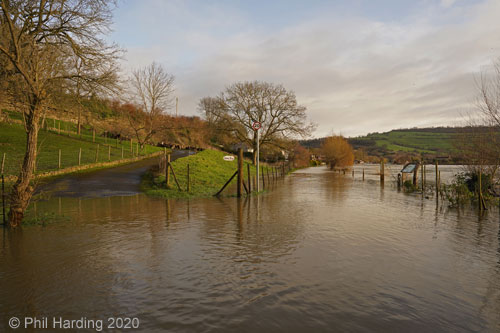|
Saltford Environment Group
|
| Home | About Us | News | Website Contents & Links | Contact |

|
SEG Home > Climate Change Climate Change"Climate change is not an environmental issue, but much more to do with security and economics" - Jonathon Porritt
The River Avon flooding the highway at Mead Lane in Saltford as a result of heavy rainfall associated with Hurricane Dennis, 17 February 2020. Climate change has been described as the greatest and most profound challenge facing humanity in the 21st Century. It requires two responses: mitigation by reducing CO2 emissions through the more sustainable use of energy, i.e. using less energy through efficiency and then using cleaner renewable sources where appropriate (our 'Energy' page covers this area), and adaptation so that our communities are more resilient and less vulnerable to climate change and extreme weather events. The purpose of this page is to help Saltford as a community become more resilient to extreme weather and to adapt to climate change. Background & making Saltford more resilientNOTE: We publish news on this topic on the news section of our home page. To prevent the most severe impacts of climate change, the international community has agreed that it should work together to try and ensure that global warming rise well below a threshold of 2oC compared to the temperature in pre-industrial times by pursuing efforts to limit it to 1.5oC. Taking account of the existing observed increase of around 0.85oC (from 1880 to 2012) this means we need to avoid a further global temperature rise of less than the existing increase that has been caused by human activities. The need to avoid a potential overshoot was underlined by Hoesung Lee, Chair of the Intergovernmental Panel on Climate Change (IPCC), addressing the G7 Environment Meeting, Bologna, Italy, on 11 June 2017 :- "Regarding the probability of extreme temperature events, the global occurrence probability of a 1-in-a-1000 day extreme temperature event is projected to be about double as the warming increases from 1.5o to 2.0o. The probability would be five times higher than today." In November 2014 the IPCC released its Synthesis Report that distils and integrates the findings of the IPCC Fifth Assessment Report produced by over 800 scientists and released over the previous 13 months - the most comprehensive assessment of climate change ever undertaken. The headline message was that "Fossil Fuels should be phased out by 2100" and that most of the world's electricity can, and must, be produced from low-carbon sources by 2050. However, regardless of action taken to curb anthropogenic carbon emissions (i.e. from human activities), some changes to our climate are unavoidable due to past emissions already in the climate system; the longevity of CO2 in the atmosphere is estimated by scientists to be up to 200 years or more whereas other greenhouse gases are relatively short-lived. We shall increasingly experience hotter, drier summers and wetter, milder winters, with more extreme weather events. Those extreme weather events will be summer heatwaves, prolonged droughts, stormy weather (higher wind velocities), heavy rainfalls causing flash flooding, and severe winter cold spells* can be expected to continue to impact on the UK including the local area. *Unpredictable changes to the location and strength of the jet stream that bring storms and weather systems across the Atlantic is another factor arising from climate change that also affects our weather patterns (e.g. cold/hot spells or additional rainfall in some winters and summers). The consequences of climate change impacts for local communities like Saltford are many and varied. These range from effects on health, damage and disruption to property, electricity, telephones and transport networks, fuel shortages, disruption or closure of businesses, schools etc., animal welfare issues, and problems with food supplies (short and medium-long term). In being aware of what these hazards and problems might be it is important to maintain a sense of perspective and not be unduly alarmed. However, if we adapt and prepare for climate change we can reduce or even avoid many of the worst effects. We have set out below some actions we can take to make our homes, gardens, business premises and business activities more resilient and less vulnerable to climate change and extreme weather. Homes, gardens & business premisesThis list is by no means exhaustive but should get you thinking on what you can do to keep your home or business premises cool in heatwaves, warm in winter, reduce the risk of flood and other damage to your property, and maintain a more resilient garden:-
Tips for making your property better prepared for flooding
Local business responseAlmost 60% of small firms do not have plans in place for extreme weather with no resilience plans whereas 66% said their business had been affected by snow, drought or floods in the last 3 years - FSB Survey (2014) It makes good business sense for our local businesses to maintain an awareness of climate change issues and to respond to the challenges posed. This approach enables business to:
See the the UKCIP Adaptation Wizard in our 'Further information & useful links' section below to see how to undertake a vulnerability assessment of your business to help you develop and implement a climate change adaptation strategy. Further information & useful linksUKCIP Adaptation Wizard (Tool)The UKCIP Adaptation Wizard is a 5-step process to help you assess your organisation's vulnerability to current climate and future climate change, identify options to address your organisation's key climate risks, and help you develop and implement a climate change adaptation strategy. The Wizard is also a guide to information, tools and resources to help you. To access the UKCIP Adaptation Wizard on the UK Climate Impacts Programme (UKCIP c/o University of Oxford) website, click here: Adaptation Wizard. Environment Agency Floodline 0345 988 1188 (24-hour service)'Warming to the idea' reportOur Chairman (Phil Harding) was involved in the production of the 2010 report, Warming to the idea, that looked at how the SW region could build its resilience to extreme weather and climate change. This comprehensive report, produced under the auspices of the Environment Agency, features future seasonal climate change projections to the 2080s, gives business sector advice on the impacts and opportunities those sectors can expect and looks at impacts on the natural environment, economy, society and infrastructure. You can download a pdf copy here: 'Warming to the idea' 2010 report (pdf 4.8MB). Some appropriate definitions:RESILIENCE - the ability of a system to absorb disturbance and still retain its basic function and structure. ADAPTATION - modification that makes an organism/organisation more fit for existence under the conditions of its environment. CLIMATE - the average conditions in the atmosphere near the earth's surface over a long period of time (30 years). EXTREME WEATHER EVENTS - these arise when natural variations in the weather and climate combine with long-term climate change. WEATHER - state of the atmosphere (temperature, cloudiness, dryness, precipitation, sunshine, wind, etc.) at a place and time, i.e. what's happening outside right now. LinksB&NES Council Responding to the Climate Emergency BBC's 'A brief history of climate change' Climate Change and your Home - Green & Low Carbon Construction Directory Climate Change, What is? - from the Met Office Cold Weather Plan for England - includes advice on keeping vulnerable people warm and healthy (see also 'Heatwave Plan for England' below) Defra: Climate Change Adaptation - what the government's doing Flooding, Prepare for - advice on how to plan and prepare for flooding and protect your property (from gov.uk) Heatwave Plan for England - includes advice on keeping cool and healthy Tree species and provenance - advice from Forest Research (the research agency of the Forestry Commission) on choosing the correct tree for a changing climate UK Climate Impacts Programme (UKCIP) - at University of Oxford - helping organisations, sectors and governments adapt to the changing climate through the generation, exchange and application of knowledge UK Climate Projections - climate projections on Met Office website United Nations' 17 Sustainable Development Goals to transform our world - Goal 13 "Take urgent action to combat climate change and its impacts" |
'Saltford Weather Station'
Page Links:-Background & making Saltford more resilient - Homes, gardens & business premises Further information & useful links Visit our 'Energy' page for CO2 saving advice and responding to the 'Climate Emergency'
"Dig the well before you are thirsty"
"We won't have a society if we destroy the environment"
"Change before you have to"
|




